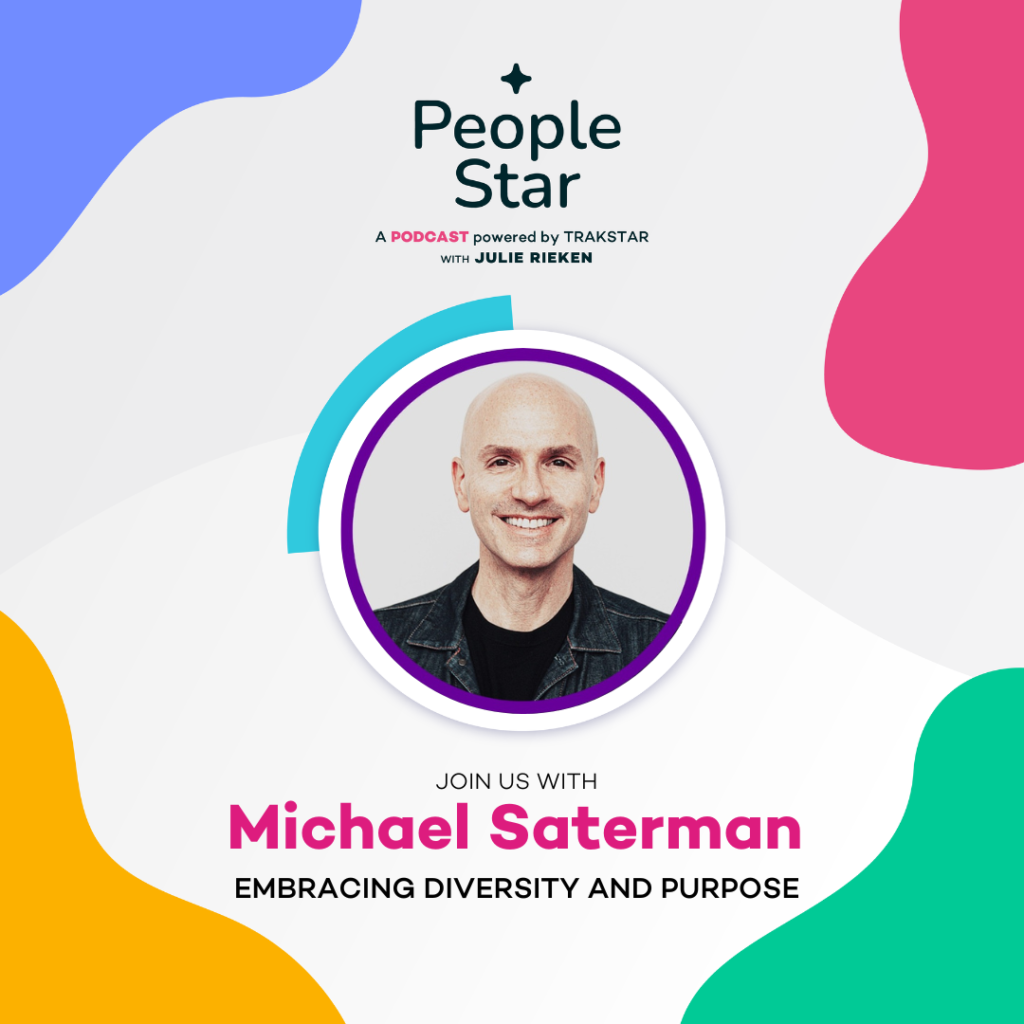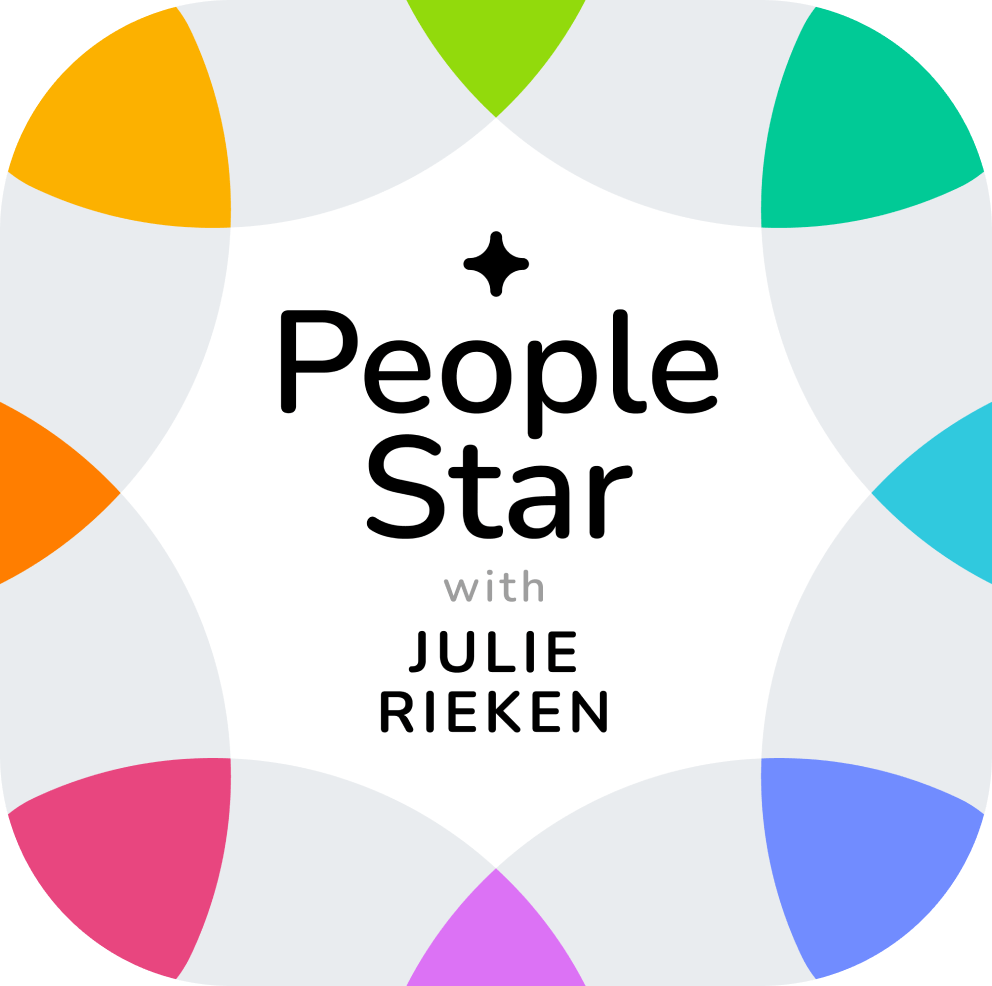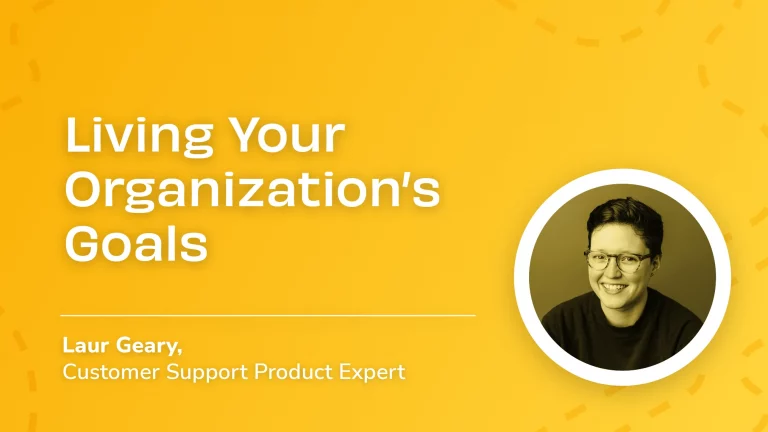PeopleStar_Michael Saterman: this mp3 audio file was automatically transcribed by Sonix with the best speech-to-text algorithms. This transcript may contain errors.
PeopleStar Intro/Outro:
Welcome to the PeopleStar Podcast. We deliver leadership perspectives from industry experts on their people, architecture, routines, and culture as they solve HR's newest challenges. And now your host, Julie Rieken.
Julie Rieken:
Good Day podcast listeners. Julie Rieken, host of PeopleStar Podcast. So excited today, we have an unusual conversation. I'm going to talk with someone outside of HR, but has connections to HR and we are going to have a fascinating conversation about working together. And my guest today is Michael Saterman of Saterman Connect. And Michael is a managing partner and a chief customer officer, so this is going to be super fun. Michael, I'm thrilled to have you as a guest. Could you tell us a little bit about yourself and what you do? And then we're going to have an interesting conversation about HR's changing role and how HR interacts with business partners and I'm excited for it.
Michael Saterman:
Julie, it's such a pleasure to be with you and the audience today, I'm really thrilled to have this conversation. I'm a chief customer officer, which I know many in your audience may not even know what that means, but I'm on the front line of Saterman Connect. I'm usually the first call or conversation with someone in human resources as they're seeking outside counsel. We focus on growing talent and evolving culture, and I often share that I am the least HR's person in a room. My background is in marketing and advertising and communications, I spent 20 years working with brands, many of which were purpose-driven. In fact, the first company I founded, More Good was focused on corporate social responsibility communication. So, I and a team worked with Coca-Cola Enterprises on their CSR report, and I share that really to point out. I understand purpose-driven brands. And as HR looks to expand their role working with the C-suite and working with their partners. It's important for them to understand their purpose and the organization's purpose and how that becomes an opportunity for them to recruit, engage, and retain their talent. So much better for the modern workforce.
Julie Rieken:
I couldn't agree more. So here we are. I'm going to pretend I'm an HR person. And you, as you've just established, are a chief customer officer with a distinguished background, working with purpose-driven brands that you would recognize. And I'm thinking HR has changed. My role is changed, I'm going to play HR here, my role has changed. I'm interacting more with the C-suite. You know, I've always helped recruit for departments. I've always helped with all the legal compliance issues that we have with HR, and I've helped managers when they have a tough conversation. And now in this new world, I'm helping develop a workforce. And I've got this guy, Michael, and he's a chief customer officer. How do I help him? What? How should I think about my role with you, a chief customer officer? How, how are we best partners?
Michael Saterman:
Well, first and foremost, I appreciate when a prospective client or client wants to help me, because my role as a consultant is to make them show up better and be heroes. And part of that in this new environment is to really appreciate that so often when there is a people issue, many in an organization or in some organizations might say that's an HR issue, like human resources handle it. But in truth, when it comes to people, it's everyone's responsibility. Every leader has a role in that. In fact, when we have leaders that are not really guiding, supporting, or leading their teams effectively, it becomes a bigger issue. It becomes a systemic issue within an organization. We've all regretfully had opportunities where we work with leaders who just don't see us, who don't hear us, and don't appreciate us. So the way in which an organization can help me is to understand what success would look like for them. And a question I'll often ask in a preliminary call is, we flash forward 12 months from now, what would success look like? What are the one, two, or three things you as an HR leader would like to change within your organization? And the reason I frame that in that way is specific, because if I asked what success would look like next week, it's going to be whatever problem is top of mind that I can try to figure out how to spend an hour and check it off my list. But if I pick something that's three or five years from now, it's so far away. I'm not going to focus any effort or energy on making change. But when it's 12 months from now, as a leader with any experience, you recognize, okay, I've got four quarters in which to make change. I can break this down in some way. Let's identify what the problem is and then maybe co-create what a solution might look like. So when a leader is able to respond to me of, I wish that my middle managers were more adept at working with hybrid teams, they've really been struggling the last three years. That's something we can talk about and figure out how to engage with in the next 12 months to start to create some of those successes and build a platform and a foundation that the organization can still take forward the next 12 months and the next 12 months or, hearing that their issue is onboarding talent that, sure, I'm here to find the best talent for my organization, but it always falls on HR's shoulders. Great, well, let's think about onboarding differently and where there may be best practices already within your organization that others may utilize and also where they can take responsibility. So when it comes to seeing success of where someone may be, three months or six months from now after they've started their role at the organization, there's this shared collective like, I know about this talent. It's not just HR and the immediate manager who knows of them, but many of us who've played an instrumental role in making sure that they feel like they're part of the organization and have been a great culture addition, making us better every day. That's the way in which they can help us.
Julie Rieken:
That is definitely a way that HR can help. And it's interesting that you bring forward some of these things like, and I can't help but believe that you've brought them forward because maybe you've experienced them. My team is here, here we are, we've got this new world of hybrid work, how do I make it better? How do I do better onboarding? These are questions that, that, that leaders like you and a chief customer officer will really encounter every day from a people management perspective and working with HR to improve something within 12 months time could really be beneficial to a group of people that you would manage. I love that answer, and I think about that because the role of HR has changed in that way. So let's think about this, so you've talked with an HR person in this role where I play guitar and then you say, you know, I really need some help with onboarding, or that would look good for me. What do you personally need from HR for in terms of you as a leader? What are some things that you, so that's for your organization, right? For the, for your direct reports and for the, the tree that … right? But what do you need from HR?
Michael Saterman:
As with any partner, I think the critical element that I need is transparency. It's my role, because I'm on the front lines to build trust, to earn that trust with someone who may be a partner for us, who we may be serving in some way. So when I ask questions about what does success look like, I'm always amazed when leaders start to share stories of some of the managers in the organization where they may be struggling or falling on their ass instead of falling on their face. It's critical for us to be as transparent, as feasible, because with that humanity comes an understanding of I don't want to come to the table with a solution you can't afford, you can't implement, you can't act on, you can't build the. But if I start to hear, listen, my budget is X dollars, I struggle with my C-suite. I don't know if I can sell this idea up. I get a clearer picture of what's going on within the organization and where we can meet you, where you are. I think that that's not only critical in our conversation, but it's also critical as HR is engaging with their colleagues and their partners to create shared success. So when human resources in partnering with their CFO, CFO may say we have 10% open jobs currently and we get this turnover issue and we keep having to spend money to hire more people, but we're also growing the organization and we want to grow by 10%. So we want to go from 400 to 440 and we also have a turnover of 10%. So I've got a higher 80 people next year. Do I have enough talent to do that? Looking at my team in HR, I'm painfully surprised is often thin when it shouldn't be, right? There may be a handful of people in human resources, maybe there is someone focused on total rewards or, or some aspect of benefits, but maybe they need another recruiter because to hire 80 people and have your bench of four or six people in HR share that responsibility, maybe too much to take on with their day to day responsibilities. But if you're able to have that transparent conversation in this instance with your CFO, these people can say, you're right, because I can't afford to lose some of the talent that we've fostered within your department and in other departments. But sure, I can carve out X dollars for a mid talent recruiter to work 40 hours a week to get that talent, because hiring 80 people over 52 weeks is a lot of effort. There's a lot that has to go through the system, but it all came from being honest with each other, being transparent. So by being transparent with me, I can help you be transparent with your partners. Maybe you can ideate about how to address that CEO who maybe, not quite in the growth mindset.
Julie Rieken:
As well as he or she might be able to. Not that I would have any issues with that.
Michael Saterman:
Fair enough. Fair enough. That's something to consider.
Julie Rieken:
I love it. Okay, you talked about the idea of working with HR. What does good look like to tackle some initiatives that might be larger, like not the front burner issue of hey, I need this form filled out by next week, da da da. You want to improve onboarding or you want to improve something, hire some people over time, and about being transparent. Now, let me ask you from this perspective, what should HR be asking you and what do you want HR to know about your team and how do you want them to get to know it? Let's just maybe, let's just take that second part first. What do you want HR to know about your team? How should they go about learning it?
Michael Saterman:
Well, our team is filled with people with various degrees of expertise and lived experiences. So we think about the modern workforce and being an inclusive leader, understanding that I may not have the answer to all their questions, but I've got a bench of pretty smart people who can help us co-create a solution, co-create an answer. Do we need someone who's a former CHRO, who's also a coach to help us co-create an answer or address what's going on within an organization? We do need someone with a lived experience of being black or brown in America to help share some perspective. We need to think about socioeconomic situations and how what we're talking about with your leadership may not be as robust as it needs to. Are we accounting for certain issues as we're trying to develop a shared future? Understanding our team, I think, can be round one, certainly I'm on the front lines and my, my slight radio voice may lead some to believe that I'm a straight white person, but I actually have another dimension of diversity of I'm part of the LGBTQ community and our CEO is my husband, which is a story unto itself for another podcast the other day.
Julie Rieken:
Oh, you want to put that in and then leave us hanging out.
Michael Saterman:
No, it's fantastic. But I try to share that very openly about our team because even from the experience of having a fantastic CEO and spouse, I've learned things along the way about his talents that I'd never seen or experienced before. I'm proud to watch him shine in front of a board or in front of a team of leaders, as well as watching him foster the growth of some of our younger talent who comes from a diverse area. We're a fully remote organization which allows us to lead organizations in so many different ways. And I think when organizations are looking to partner with us, it's important for them to understand that we're trying to build an organization, build a company that is full of those who may not be part of the in-crowd for so many years. We're not full of straight white men, although they're welcome to join our company. We're full of people who are traditionally underpaid, underseen, underutilized, and we're giving them a space to bring forth brilliant ideas and serve. So when I'm working with a client who starts talking about budget, I may share, is that what you're willing to pay any organization? Because maybe that's just the way they've always worked with external talent. But when the talent is mainly female who, who are traditionally underpaid, maybe we need to think a little differently. Maybe we need to think about where the organization is focusing its effort and energy, because in my experience, when HR is working on initiatives around talent development, leadership development, just development in general, there's opportunities for outsized impact, right? If you invest in your people, they're not going to leave, they're going to stay. And if you choose not to invest in your people, do you really want them to hang around? It becomes that opportunity to think about by developing our talent within any organization, you can grow them into the leaders of tomorrow to serve your organization in a future you've not yet imagined. And that could be a really beautiful thing.
Julie Rieken:
Michael, I love that. I think, what I'm pulling, a thread that I'm pulling out of what you've just shared in a way that HR can be a really strong partner to you is to understand the individual strengths on your team and maybe some of the collective experiences. Do I have a group of women who may have had experiences before with pay inequity? Do I have a group of people that have been traditionally less visible, whether that's, you mentioned People of Color or the LGBTQ community or however, however that may shape in an organization, for HR to be really aware of what those individual strengths and diversities are so that they can look to add to it, create balance, provide a lens on, on, on ways to serve a community, whether you mentioned economics as well, and for HR to really be a partner to you and understanding who those people are on your team so they can think about your areas of strength and your areas of need from an individual level is what I think I got from that. Did I hear you correctly?
Michael Saterman:
Yeah, we're, we're diverse and organizations that are striving to embrace their diversity with whatever that may look like or whatever future they they want to step into. What I find intriguing about the modern workforce is you still have plenty of leaders, not even in HR, just their partners, who might say, I just want someone who will show up and do the job. No one just shows up and does the job anymore. They bring their fight with their spouse to work. They bring their child care issues to the job. They bring their mental health struggles into their day. And when you see them, when you acknowledge them, when you recognize them, whether they are a partner as we might be, or where they're talent on your team, you give them a chance to breathe, take a moment, take a step, and give them the space to solve problems on their own terms. That's really critical as we think about how organizations partner. If you think of partnership with a consultant or with a team member as a transaction, that's all it's going to be. And if it's transactional, it can fade, fade away very quickly. But if there is emotional buy in, if there's shared trust, if there's transparency, you have a better chance for that talent to solve the big problems with you and be meaningful contributors to your organization. Again, whether are someone like us, like Saterman Connect, or whether they're telling your team, we've yet to really encourage and blossom and that's valuable.
Julie Rieken:
Michael, this has been a super fun conversation. I love the thoughts of how HR can help, and I do really, I thoroughly enjoy just hearing the perspective of someone who's, I'm going to go back to your original comment, which I thought was brilliant, the least HR-ish of the people on your team, and thinking about how we partner with all the different people across our organizations and how HR can partner with people that maybe haven't traditionally been partners. So this has been really fun to hear your perspective. Thank you for being a guest.
Michael Saterman:
Julie, thank you for welcoming me and giving me the space to share some thoughts. It's been a delightful time and I've appreciated your thoughtful and introspective questions.
Julie Rieken:
Thank you.
Michael Saterman:
Bye.
PeopleStar Intro/Outro:
Thanks for listening to the PeopleStar Podcast. For the show notes, transcript, resources, and more ways to get a seat at the table, visit us at TrakStar.com/Podcast.
Sonix has many features that you’d love including upload many different filetypes, secure transcription and file storage, transcribe multiple languages, world-class support, and easily transcribe your Zoom meetings. Try Sonix for free today.




